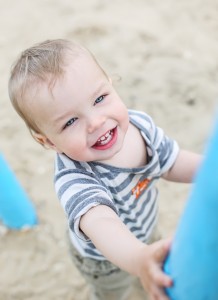The post Debt free toddlers appeared first on All4Baby.
]]>However, even if you have budgeted carefully, as your child grows into a toddler, so do the financial responsibilities of being a parent.
Toddlers come with a unique set of costs
Eunice Sibiya, head of Consumer Education at FNB says, “The first year of your baby’s life has certain cost implications, but between the ages of one and three, your toddler comes with their own unique set of costs. They are more social, attending birthday parties and might be going to a playschool or a childcare centre. The best thing you can do is be financially prepared for them.”
Going to not-so-big school
Many parents decide to enroll their toddlers in a childcare facility because their social skills are more established, and many agree that learning through play is beneficial for their development. Whether you decide on a crèche or playgroup, or both, Sibiya says that you should do your homework.
“You need to ask whether you and your toddler are getting value for your money,” says Sibiya. “Different facilities offer different services. Do you want a daycare, crèche or playgoup? Some crèches ask you to bring nappies and toiletries, while others include this in the cost. Decide on what you want and ask whether you and your toddler can have a trial run.”
If you’re choosing a childcare facility, let your child attend for a week, as a trial run. Also find out if your employer offers this facility. There are usually staff discounts and you won’t have to change your driving routine. You’ll also be close to your little one during the day.
Sibiya says that once you’ve decided on childcare or a playgroup, or both, you need to add this expense to your budget.
Sibiya also offers some tips, “Find out if your child’s school offers any sort of discount for early payment. It’s a good idea to use your bonus to pay for your child’s annual tuition, as you might get a discount if you do this.”
She adds that if you have two or more children at the same school, it might be worth asking if there are discounts for the second and third child.
Birthday parties
Once your child starts interacting with other kids, they will be invited to birthday parties and chances are that you will be attending a birthday party almost every weekend. You will also have your own child’s birthday party to plan for.
“When attending other children’s birthday parties, try and find toys that work for both boys and girls like puzzles, play dough or bubbles. You could buy a variety of these toys in bulk, and even better if you buy them on special. Then bring them out whenever you have a party to go to,” says Sibiya.
This will give your budget a break in that you won’t be buying toys every month
“For your own child’s birthday, try to be cost conscious, hosting at home will save money and asking friends and family to help bake will go a long way.
“To be even more financially savvy, instead of asking for presents, ask close family and friends to pay small cash sums to an account that will go towards saving for your child’s education. You will be surprised at how quickly these small amounts add up over the years, and you will also be surprised at how relieved adults will be with this simple option,” says Sibiya.
Medical costs
Another cost to think about is that when your child goes to crèche or preschool, their immune system may be compromised due to being exposed to the outside work comes into contact with other children, they come into contact with germs.
Their immune systems might still be vulnerable, so bundle them up warmly in winter and if you want, there are immune boosting medications that you can make use of.
Sibiya says it would also be a good idea to double check what sort of medical aid plan you and your family are on. She suggests that you call your medical aid and perhaps re-evaluate your needs and the plan you’re on.
“As your child grows, their needs change and your budget needs to adjust accordingly. The best way to stay on top of this is to be financially responsible and re-evaluate your budget on a regular basis,” concludes Sibiya.
The post Debt free toddlers appeared first on All4Baby.
]]>The post The sensory link to your baby’s sleeping disorders appeared first on All4Baby.
]]>Sleep is vital for our physical and emotional well being. It is well known that it promotes the secretion of growth hormone as well as restoring brain processes. This enables us to perform subtle cognitive and social tasks as we go about our daily lives.
It may be surprising to note that the very same environmental, behavioural and social factors that may interfere with sleep, can play an important role in ensuring healthy sleep habits from the start.
In daily practice, when one is presented with an “unsettled infant”, or a “badly behaved toddler”, lack of sleep, or plain exhaustion is often not considered, as the practitioner is often too busy looking for a “physical reason” for the childs’ distress.
Physiological factors that affect sleep
There are obviously certain physiological factors to exclude from the outset, and a detailed history from the parent (or caregiver) is necessary. The obvious factors should include the following:
- Illness
- Nutrition
- Digestive disturbances
- Allergies
- Anaemia
- Parasitic infection (worms)
- Candida (thrush):oral/systemic/peri-anal
- Teething
- Nappy rash
- Emotional trauma
Once these factors have been excluded, the area of sensory overload should be investigated.
Sensory integration
The behaviour displayed by an infant or toddler upon exposure to sensory input will differ depending on the manner in which the stimulus is interpreted.
The sensory system functions in order to form a composite picture of what is going on around us. Sensory integration is the critical function of the brain that is responsible for producing this picture.
For most of us, effective sensory integration occurs automatically, unconsciously and without effort. However, for most infants, particularly premature babies, and toddlers with sensory integration difficulties, this process is inefficient due to immaturity of the sensory system. Therefore, babies and some toddlers will have difficulty in processing too much sensory stimuli.
Exposing a baby to sensory stimuli
When a child is exposed to sensory stimuli, a pattern usually occurs.
The child may interpret the stimuli as non stressful and respond to the stimuli appropriately. This response will not affect the stability of the behavioural subsystems of the nervous system.
Approach signals
The child will display self-regulation approach signals.These signals indicate that she is in control, and is neurologically well organized. Children displaying these signals appear to be inviting interaction.
These signals include:
- Soft and relaxed facial expression, with alert and open eyes
- Relaxed limbs with smooth body movements and minimal motor activity
- Turning towards sound and visual stimuli with interest
- A toddler will ask and respond to questions, smile and laugh
Warning signals
The child starts to experience stress when the exposure to the stimuli continues. The child will display some warning signals. At this stage she still has the ability to self-organise or self-regulate.
She is able to produce a behaviour to decrease the effect of the stress, thus preserving the stability of the behavioural subsystems of her nervous system.
Warning signals that the child is becoming overloaded include:
- Hand(s) on face
- Fingers or hands in mouth or nose
- Fisting
- Bracing of legs or body
- Shifting to a drowsy state(infant); wanting to lie down(toddler)
- Fidgeting
- Decreased eye contact with you
- Sucking(infant); excessive mouthing(toddler)
This is the stage to allow the baby or toddler to go to sleep. All further stimulation should be avoided at this point. These signals must be interpreted as warning messages that the child may be reaching maximum tolerable stress levels. It is important to note that if the child is given some space to “zone out” she will be able to regulate her state of sensory overload herself to enable her to go to sleep unaided.
Stressed signals
If the exposure to the stress/stimuli continues, it will stress the child to such a degree that she becomes unable to overcome the effect of the stress by self-regulation(above). The compensating lower subsystem of the nervous system becomes unstable, resulting in a stress reaction such as crying and inability to fall asleep unaided. She will now need extensive help such as sucking on the breast or a bottle, being rocked or driven in a car in order to fall asleep. These stressed signals signal the end of the child’s ability to self regulate, and include:
- Loss of eye contact, or staring into space
- Irritability
- Moaning ,whining and crying
- Tantrums (toddler)
- Frantic, disorganized, jerky movements(infant); excessive fidgeting(toddler)
- Hands and fingers shielding the face
- Changes in vital signs such as heart rate and respiration
- Trunk arching
- Tongue thrusting(infant)
- Yawning, sneezing and hiccupping
- Gagging or spitting up
- Colour changes – paleness, mottling, flushing, cyanosis
These signs are very often misinterpreted as colic(infant), or boredom or bad behaviour(toddler). However, the sensory system at this stage is in such disorganization that it is unable to self-calm, and the child will end up crying inconsolably(infant), or having a tantrum(toddler). It is very important at this stage to:
- Modulate the environment for the child – remove stimulation
- Encourage and facilitate hand to mouth activity (sucking fingers, dummy)
- Encourage finger grasping
- Deep hug(toddler)
- Place your finger in the infants palm
- Swaddle the infant or place in a sling
- Allow the infant to “nest” in flexion
Children who are constantly over-stimulated and or deprived of “quiet time” will remain in this level of stress, and will thus never sleep.
To avoid children entering into this stressed, over-stimulated, over-tired state, it is crucial to avoid excessive stimulation, and to monitor how much time the child spends awake between sleep cycles. It is important that children are allowed to sleep before they reach this state of over-tiredness.
The post The sensory link to your baby’s sleeping disorders appeared first on All4Baby.
]]>The post Sleep and a sick baby: what to do and what not to do appeared first on All4Baby.
]]>Just think back to the last time you had a cold: Even though you felt more fatigued, and your body needed the rest, you definitely did not sleep as well.
I’ve, very rarely, met a child who sleeps perfectly through an illness. The ugly truth is that no-one sleeps well when they’re ill, and very few children sleep soundly when they are sick.
Prepare yourself. There are definitely going to be some wake ups that you should respond to. You have a sick child that will need some comfort and attention, and it is important that you support your child through this uncomfortable stage.
Maintain a normal sleep routine
It is important to maintain the normal sleep routine as far as possible. It is easy to fall into an emotional trap. Many parents, at the onset of child illness, commence with night-time feeding.
However, if you’ve got a healthy, six month, eight month old, or 10 month old, who has had several weeks or months of peaceful sleep, there’s no sensible reason to start night-time feeding if they are ill.
You could offer your child a sip of water as their throat might seem a little dry. You might need to wipe their nose. It’s even fine to give a few cuddles. However, you want to make sure you put your child back in their usual sleeping environment.
Most children will not let you change their usual routine. Even if you try to rock your ill child to sleep, he or she will most likely resist it. Parents have experienced their little ones pushing them away or arching their back toward the crib. Older children might even point to their cribs, or say “no” to the cuddling.
If your doctor has recommended that you offer some night feeds to aid the healing process of a serious illness, or if your child has had a very high fever for a few days and night-time feeds will curb the dehydration, then it is essential to follow doctor’s orders.
Always remain mindful of how you are implementing your actions, however, as you definitely don’t want to let your child fall asleep while feeding or by using it as a prop when the child is ill.
The goal should be to maintain the healthy sleep habits that were learned by you and your child, while providing the nurturing and support to your ill child.
Set up camp in your baby’s room
Offer to feed, keep her awake through the feed, and then place her right back in the crib again. When people are very concerned about their sick babies, they often put the baby in bed with them. However, it is more sensible to move a mattress to your baby’s room.
Set up camp, and keep an eye on the sick child without changing her immediate sleep environment. Once you’re convinced she’ll manage on her own, get yourself back to your own bed as quickly as you can.
While this might initially be more effort, the long term benefits are priceless. It is far less disruptive to move into your child’s room to watch over her, than taking her into bed with you.
Keep the long term reward of sweet sleep in mind, and continue to nurture and support the sick child to wellness, so that the sleep cycle is maintained.
About the Author: Good Night is a child and baby sleep consultancy that specialises in helping parents with children who struggle to sleep soundly. For more information, visit: www.goodnightbaby.co.za
The post Sleep and a sick baby: what to do and what not to do appeared first on All4Baby.
]]>

